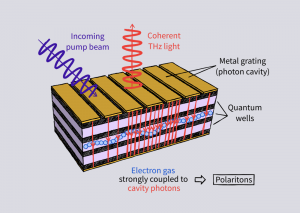Summary
An efficient source of terahertz radiation has the potential to improve characterization methods for drugs, proteins and bacteria, enable ultra-fast wireless data transfer over short distances for use in “smart factories”, and offer enhanced detection capabilities with the ability to see through packaging. However, terahertz light is particularly difficult to produce, and existing sources remain too bulky and power-hungry for widespread application.
We are working to develop more compact and efficient terahertz light sources using polaritons – hybrid particles consisting of a photon coupled strongly with a material excitation. This approach utilizes a plethora of quantum phenomena, from trapped photons, to quasiparticles, to Bose-Einstein condensation. By exploiting these unconventional effects we hope to pave the way towards a long-awaited practical source of terahertz light.

Related Content

Ultrafast Dynamical Studies of Valley-Based Qubits
Summary As monolayers, transition metal dichalcogenides (TMDCs) – such as tungsten diselenide (WSe2) – become direct-bandgap semiconductors capable of emitting light. Compared to conventional direct-bandgap semiconductors, such as III-V semiconductors like GaAs, excitons (quasiparticles made of an electron hole bound with an electron) and single-layer TMDCs (SL-TMDCs) have much stronger binding energy. Excitons and […]
June 29, 2018

Repurposing potential drug candidates for the treatment of COVID-19
Summary The main protease (Mpro) in severe acute respiratory syndrome coronavirus 2 (SARS-CoV-2), the virus responsible for the coronavirus disease (COVID-19), has emerged as a promising drug target. The scientific community has produced a large number of crystallographic structures of the protease, which mediates viral replication and transcription. These structures report several fragments with varied chemotypes […]
May 6, 2020

Micro-Supercapacitors Based on Termination Optimized MXene Quantum Dots with Ultra-High Rate Capability and Fast Frequency Response
Micro-supercapacitors (MCs) are miniaturized energy storage devices that can enhance the performance of wearable health devices, medical implants, wireless sensors, and micro-electromechanical systems due to their fast frequency response, long life cycle, and vast temperature operation. However, to make these MC systems into commercially feasible products, necessary improvements to current MC performance are necessary, primarily […]
June 12, 2023
Fabrication of Ultra Low Noise RF SQUID Amplifiers
A superconducting quantum interference device (SQUID) is an extremely sensitive magnetic field detector.
June 1, 2017

